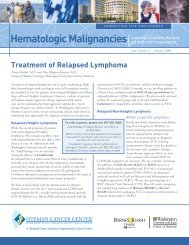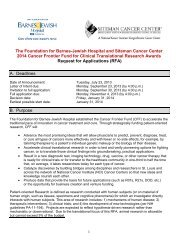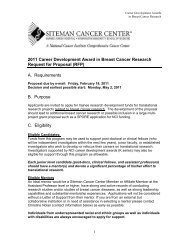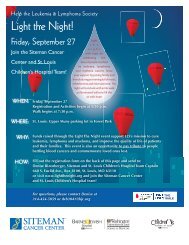Planting the Seeds of Prevention - Siteman Cancer Center
Planting the Seeds of Prevention - Siteman Cancer Center
Planting the Seeds of Prevention - Siteman Cancer Center
Create successful ePaper yourself
Turn your PDF publications into a flip-book with our unique Google optimized e-Paper software.
Gerald Andriole, MD, talks<br />
with longtime patient Paul<br />
Colombo <strong>of</strong> St. Louis. In 1990,<br />
a <strong>the</strong>n-new PSA test detected<br />
Colombo’s prostate cancer.<br />
Andriole performed surgery and<br />
still provides follow-up care.<br />
10 The Alvin J. <strong>Siteman</strong> <strong>Cancer</strong> <strong>Center</strong><br />
Unearthing Disease<br />
Refining <strong>the</strong> Science <strong>of</strong> Prostate <strong>Cancer</strong> Screening<br />
It is evidence <strong>of</strong> <strong>the</strong> complexity <strong>of</strong> prostate cancer that so much <strong>of</strong> <strong>the</strong> disease’s story<br />
remains unresolved, even though it is <strong>the</strong> most common nonskin cancer in men, affecting<br />
one in six, with an estimated 186,000 new diagnoses in 2008. Large studies performed<br />
over several years have examined prostate screening’s effectiveness, but still, <strong>the</strong> endings to<br />
many <strong>of</strong> its subplots have yet to be written.<br />
A major character in <strong>the</strong> prostate cancer story always has been <strong>the</strong> <strong>Siteman</strong> <strong>Cancer</strong><br />
<strong>Center</strong> at Barnes-Jewish Hospital and Washington University School <strong>of</strong> Medicine, a leader<br />
in <strong>the</strong> field. It was here, beginning in 1989, that <strong>the</strong> <strong>the</strong>n-new PSA test for prostate cancer<br />
— a blood test for an elevated level <strong>of</strong> <strong>the</strong> protein called prostate-specific antigen, or PSA —<br />
was systematically evaluated. In this study, more than 30,000 St. Louis-area men had <strong>the</strong>ir<br />
PSA levels tested regularly. If <strong>the</strong>ir level was abnormal, <strong>the</strong>y underwent biopsies to see if<br />
<strong>the</strong>y had cancer.<br />
The results were clear: The PSA test found prostate cancer when it was still contained in<br />
<strong>the</strong> small gland in 95 percent to 98 percent <strong>of</strong> <strong>the</strong> cases. “That was a terrific improvement,” says<br />
Gerald Andriole, MD, pr<strong>of</strong>essor and chief <strong>of</strong> urologic surgery at Washington University School

















